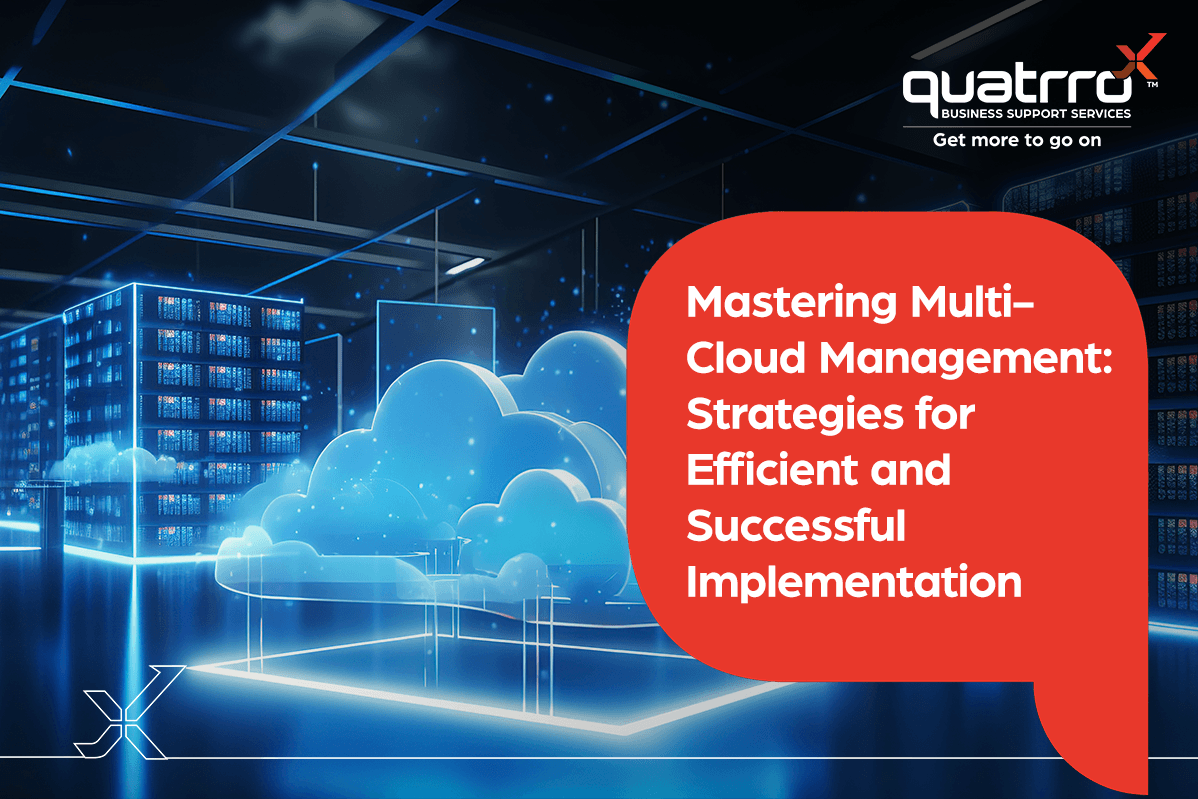Blog Details
Mastering Multi-Cloud Management: Strategies for Efficient and Successful Implementation
October 29, 2024

The Multi-Cloud Dilemma: Navigating the Complexities of a Hybrid Cloud Landscape
The cloud revolution has transformed the way businesses operate. Public cloud providers now offer a wide range of scalable and cost-effective services, enabling businesses to reach unprecedented levels of agility and innovation. However, relying solely on a single public cloud solution may not always be ideal. . Organizations with specific regulatory needs or sensitive data might find the security and control offered by a private cloud more appealing. Additionally, some workloads could benefit from the specialized features or pricing structures offered by a particular cloud provider.This is where the hybrid cloud approach becomes invaluable. . By combining the strengths of both public and private clouds, businesses can customize their infrastructure to suit their precise needs and requirements. . Yet this flexibility also introduces a new challenge: the Multi-Cloud Dilemma.
A Multi-Cloud Strategy entails leveraging services from multiple cloud providers to optimize your infrastructure. This strategy allows you to:
- Benefit from best-in-breed solutions: Leverage the specialized strengths of different cloud providers. For instance, one provider may excel in data analytics capabilities, while another shines in machine learning or artificial intelligence. By adopting a multi-cloud approach, you can select the most efficient service for each specific task, optimizing performance and cost.
- Reduce vendor lock-in: Avoid dependence on a single vendor, fostering greater negotiating power and future flexibility. By distributing your workloads across multiple providers, you reduce the risk of being locked into a single vendor’s pricing or service limitations. This gives you more leverage when negotiating contracts and allows you to easily switch providers, if necessary.
- Cloud Integration: Silos of data and applications across clouds can hinder performance and create data management headaches. Integrating disparate systems requires specialized tools and expertise to ensure smooth communication and data flow. Without proper integration, users may experience delays or errors when accessing data or applications located in different cloud environments. Additionally, maintaining data consistency across multiple clouds becomes a challenge, increasing the risk of errors and inconsistencies.
- Cloud Security: Ensuring consistent security policies and compliance across different cloud providers requires careful planning and expertise. Security configurations and access controls need to be meticulously designed and implemented to safeguard your data and applications across all cloud environments. Different cloud providers have their own security tools and methodologies, making it difficult to maintain a consistent security posture. Furthermore, adhering to strict industry regulations like HIPAA or PCI DSS becomes more complex in a multi-cloud setting.
- Operational Overhead: Juggling multiple cloud consoles and billing systems can be a significant burden on IT resources. Managing separate logins, monitoring tools, and billing statements across different cloud providers consumes valuable IT time and effort. This can lead to inefficiencies, delayed troubleshooting, and increased costs associated with managing a complex cloud infrastructure.
- Develop a Multi-Cloud Strategy Tailored to Your Needs: Through in-depth discussions and workshops, we help you assess your business goals, application requirements, security posture, and compliance needs. Leveraging our expertise, we design a multi-cloud architecture that optimizes performance, cost, and security for your unique requirements. Outline Seamless Cloud Integration for a Unified Experience: Our team includes seasoned integration specialists who can seamlessly connect your applications and data across various cloud platforms. We leverage industry-leading integration tools and methodologies to ensure a unified user experience, allowing your teams to access and utilize data regardless of its location in the cloud.
- Ensure Robust Cloud Security that Meets Compliance Standards: We understand the critical importance of security in a multi-cloud environment. Our team of security architects will collaborate with you to outline and implement consistent security policies and access controls across all your cloud deployments. We help you navigate the intricacies of cloud security compliance, ensuring your infrastructure adheres to the most stringent industry regulations.
- Simplify Cloud Management for Reduced Overhead: Managing multiple cloud environments can be overwhelming. Quatrro offers a comprehensive suite of cloud management tools and services to streamline your operations and control your costs. Our experts will help you automate routine tasks, centralize monitoring and logging, and gain real-time insights into your cloud environment and usage, allowing your IT team to focus on strategic initiatives and innovation.
- Reduced Costs: Optimize your cloud spend by leveraging the most cost-effective solutions from various providers and only paying for what you need.
- Increased Agility: Respond faster to changing business needs with the flexibility of a multi-cloud environment.
- Enhanced Security: Enjoy the peace of mind that comes from a secure and compliant cloud infrastructure.
- Improved Efficiency: Streamline your cloud operations and free up IT resources for strategic initiatives.
The multi-cloud landscape offers immense opportunities, but it also comes with challenges. By partnering with Quatrro, you can navigate these complexities with confidence and unlock the full potential of your hybrid cloud environment. Contact us today to discuss your multi-cloud strategy and discover how we can help you achieve your business goals.
Latest Insights
Related Blogs
Contact Us








